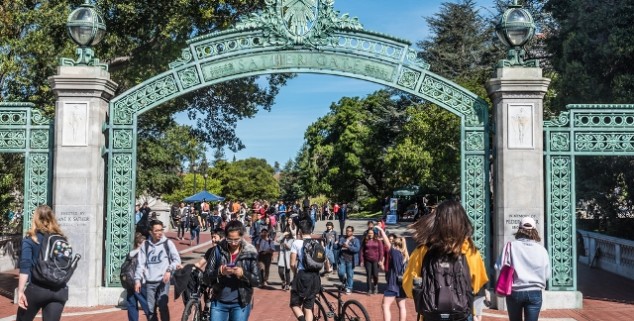News
State auditor targets UC fiscal, admission policies
 UC Berkeley students at Sather Gate. (Photo: Rightdx, via Shutterstock)
UC Berkeley students at Sather Gate. (Photo: Rightdx, via Shutterstock) In a scathing report, the state auditor says the University of California has catered to out-of-state and foreign applicants, who pay more than in-state students, and allowed thousands of nonresident students to attend UC – even though they had lower qualifications than the median for resident students.
“From academic years 2005-06 through 2014-15, the university’s campuses denied admission to nearly 4,300 residents whose academic scores met or exceeded all of the median scores for nonresidents whom the university admitted to the campus of their choice,” State Auditor Elaine Howle wrote.
UC admitted nearly 16,000 nonresidents whose academic scores fell below the median for admitted residents at the same campus on every grade point average and admission test score we evaluated.
Howle, who audits government operations at the direction of the Joint Legislative Audit Committee, released the 116-page report on Tuesday.
UC, one of the nation’s top public universities, has some 252,000 students at 10 campuses.
“In response to reduced state funding, (UC) has made substantial efforts to enroll more nonresident students, who pay significantly more annual tuition and mandatory fees than resident students—$37,000 compared to $12,240 in academic year 2014-15,” according to the audit. “The results are stark: From academic years 2010-11 through 2014-15, total nonresident enrollment at the university increased by 82 percent, or 18,000 students, while resident enrollment decreased by 2,200 students, or 1 percent.”
The enrollment shift followed a policy that UC adopted in 2011, Howle noted. She said that the state’s Master Plan for Higher Education “recommends that nonresidents possess academic qualifications that are equivalent to those of the upper half of residents who are eligible for admission. That is, nonresidents should demonstrate higher qualifications than the median for residents.”
But “the university modified its admission standard to state that nonresidents need only to ‘compare favorably’ to residents,” the audit said.
UC encouraged campuses to “maximize nonresident enrollment by allowing them to retain their nonresident tuition.”
“During a three-year period after this change, the university admitted nearly 16,000 nonresidents whose academic scores fell below the median for admitted residents at the same campus on every grade point average and admission test score we evaluated. By admitting nonresidents with lower academic qualifications on these key indicators than the median for residents it admitted, the university essentially deprived admittance to highly qualified residents,” according to the audit.
UC President Janet Napolitano, in a March 8 response to Howle, said that UC “is always open to constructive recommendations, and desires to work with you as you prepare the final report. As it currently stands, however, the draft audit is neither accurate nor helpful and thus requires major revision.”
The auditor’s office said the report released Tuesday was reviewed by Napolitano, and was the final document — not a draft.
Napolitano also said that UC “is obligated to enroll every California student for whom the state provides enrollment funding. And, once again, UC has not only met, but exceeded, this goal, enrolling thousands of California students for whom we did not receive enrollment funding.”
Among the audit’s findings:
–Nonresident enrollment increased by 82 percent during 2010-2015, while resident enrollment decreased by 1 percent during the same period.
–The university denied an increasingly large percentage of resident students permission to attend the campus of their choice. But nonresidents, if admitted, were not denied admission to the campus of their choice.
–The university has encouraged campuses to “maximize nonresident enrollment by allowing them to retain their nonresident tuition and establishing separate enrollment targets for residents and nonresidents.”
–Admission decisions have hampered efforts for its student body to reflect the diversity of the State—only 11 percent of the increasing number of nonresident undergraduates were from underrepresented minorities in academic year 2014-15.
Howle said the university had other options for raising revenue without boosting tuition or nonresident enrollment, and noted that UC’s costs rose from nearly $8 billion to $13 billion during the past decade.
The auditor also questioned the university’s fiscal stewardship, reporting that UC “excluded $886 million of state funds in fiscal year 2014-15 from the amount it distributed to campuses for per-student funding.”
In her response, Napolitano noted that the most recent state audit of the university’s finances, from July 2011, found that “The University of California Office of the President maintains extensive accounting records in its corporate financial system that document the university’s annual financial operations.”
“In light of what the University already produces, the new reporting requirements proposed in the draft report are burdensome, of little value, and would entail significant new expense to install new technology and prepare even more documentation. It is contradictory to suggest, on the one hand, that the University should reduce the number of administrative staff and, on the other hand, to recommend even more reporting requirements than currently exist,” Napolitano wrote.
Want to see more stories like this? Sign up for The Roundup, the free daily newsletter about California politics from the editors of Capitol Weekly. Stay up to date on the news you need to know.
Sign up below, then look for a confirmation email in your inbox.

Leave a Reply